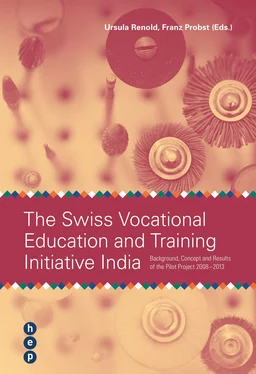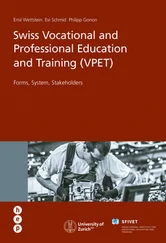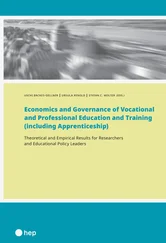This initiative requires a series of follow-up projects in order to ensure its long-term success. The pilot project described in this book is merely an initiation phase implemented to achieve a type of proof of concept. Over the next ten to twenty years, partnerships between national and local authorities, professional associations, coordinating entities, educational institutions and other actors are to be tested and developed in the corresponding regions, and sustainability is to be created.
Since the professional associations of the employment system (formerly industry associations) have a major role to play in creating framework curricula and drafting ordinances in Switzerland, it is essential that a corresponding professional association or – from a functional point of view – another coordinating entity is prepared to collaborate. As such, complex institutional arrangements can be realised only in the medium or long term, and interim solutions in the form of private intermediary institutions for the pilot phase are also needed. The target in the medium term is for the Swiss professional association to provide its know-how in the development of vocational education and training to the partner organisation or the participating companies against a licence fee, help with the implementation and monitor the quality of the training being conducted. Viewed in this light, we can speak of an export of services. The regional vocational education and training institutes are included as much as possible in the schooling part, with the Indian government bearing the costs here, too – as in Switzerland – so that vocational education and training can be offered without significant costs for the Indian students. This would improve the equal opportunities in the education system.
The Swiss Vocational Education and Training Initiative India has several objectives. The main one is to enable small and medium-sized Swiss companies to train their young professionals themselves in their own company and to the required level of quality, for which they would be supported by their professional association’s competence centre. In this way, they would also be shaping the qualification standards in the industry to a certain extent and contributing to worldwide acknowledgement of vocational education and training as an institution. However, this initiative also aims to contribute towards integrating young Indians as broadly as possible into the employment market, enabling them to have access to vocational and private prospects, and thus reducing the deep-seated values regarding prestige. Last but not least, the provisions of the employment market regulations will be linked meaningfully with education.
Anthology
This book describes the background, concepts and results of the Swiss Vocational Education and Training Initiative India. Part I consolidates the important elements of the Swiss and Indian education and vocational education and training systems. Part II presents the background, point of departure and the guiding principles for the pilot project from various perspectives, and describes the various approaches taken to date by the private sector and the state in the area of vocational education and training. Part III describes the conceptual aspects of this innovation and the challenges that need to be overcome. Part IV forms the core of the book. This section explains in detail the development and implementation of both pilot projects in Pune and Bangalore. Part V gives a summary of the evaluation results and highlights the model approach’s development potential. In the final part, the editors draw conclusions based on the results.
As is often the case in all innovative projects, many people were also involved in the pilot project of the Swiss Vocational Education and Training Initiative India. They often provided their services and support free of charge. We would like to take this opportunity to thank all those who were willing to support the idea of this very risky project by providing personnel or funding, and who have thus enabled many young people in the world to have access to vocational education and training. On the Swiss side, we would like to thank the following people and institutions: Federal councillors Doris Leuthard and Johann Schneider-Ammann, who supported the initiation and execution of the project, the members of Swissmem responsible for the initiative, as well as the Swiss Employers Confederation, the Swiss Indian Chamber of Commerce, officials of the former Federal Office for Professional Education and Technology (OPET) as well as the current State Secretariat for Education, Research and Innovation (SERI), the Swiss Embassy and the Swiss General Consulate in India, members of the Federal Vocational and Professional Education and Training Commission, the Federal Institute for Vocational Education and Training (SFIVET) as well as the evaluators of the pilot project. On the Indian side, we would like to thank the national authority representatives as well as the regional authorities of Karnataka, Maharashtra and Gujarat, the FICCI and CII chambers of industry, the dedicated staff at the National Skill Development Agency and the National Skill Development Corporation, who encouraged us to persevere in the challenging journey until we reached the finishing line. They encouraged us to apply a bottom-up approach to the pilot project, acquire the support of companies, involve local vocational education and training schools and train Indian teachers for our special requirements. Our special thanks go to the local implementation partner Nacks Venture in Bangalore and SkillSonics in Bangalore and Zurich, who made the success of the project possible in a short space of time and with great flexibility, together with all the Swiss participants. We would also like to thank all the authors for their readiness to provide a summary of their experiences, thus making the accomplishments accessible to a wide group of interested people. We hope this book will also contribute towards identifying the opportunities and risks involved in adapting the dual vocational education and training model in other countries, and help many other organisations and actors in the working world to develop their own internationalisation strategies.
With the Swiss Vocational Education and Training Initiative India, the editors are convinced that Switzerland has initiated a form of bilateral cooperation which will help not only to provide a perspective within the country and internationally but will also contribute to increasing the prestige of vocational education and training worldwide.
Word of thanks for financial support
Publication of this book in English and German was made possible thanks to the generous financial support of Swissmem and the Johann Jacob Rieter Foundation.
We would also like to thank Ms Esther Reist, Ms Lynn Grob and Hylia Ismaili of Probst Partner AG, as well as Maria Esther Egg, Johanna Kemper, Thomas Bolli and Katie Caves of the Education Systems research division at ETH Zurich’s KOF Swiss Economic Institute for their valuable support. Finally, we wish to thank Glenn Zasman, Luxemburg, for his excellent and efficient editing services.
Zurich, June 2016
Ursula Renold
Franz Probst
Literature
Biavaschi, C., Eichhorst, W., Giulietti, C., Kendzia, M., Muravyev, A., Pieters, J., Rodríguez-Planas, N., Schmidl, R., & Zimmermann, K. F. (2012). Youth Unemployment and Vocational Training. IZA Discussion Paper No. 6890.
Finegold, D. (1999). Creating Self-Sustaining, High-Skill Ecosystems. Oxford Review of Economic Policy, 15 (1) (pp. 60–81.)
Government of India (2009). National Skill Development Policy. www.skilldevelopment.gov.in/assets/images/NationalSkillDevelopmentPolicy-Mar09.pdf[accessed on 7.9.2015].
Hall, P. A., & Soskice, D. W. (Eds.) (2001). Varieties of Capitalism: The Institutional Foundations of Comparative Advantage. Oxford: Oxford University Press.
Читать дальше












